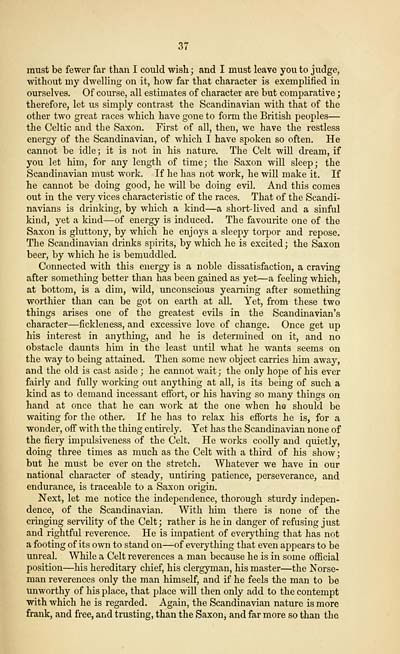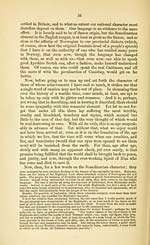Download files
Complete book:
Individual page:
Thumbnail gallery: Grid view | List view

37
must be fewer far than I could wish ; and I must leave you to judge,
without my dwelling on it, how far that character is exemplified in
ourselves. Of course, all estimates of character are but comparative ;
therefore, let us simply contrast the Scandinavian with that of the
other two great races which have gone to form the British peoples —
the Celtic and the Saxon. First of all, then, we have the restless
energy of the Scandinavian, of which I have spoken so often. He
cannot be idle ; it is not in his nature. The Celt will dream, if
you let him, for any length of time; the Saxon will sleep; the
Scandinavian must work. If he has not work, he will make it. If
he cannot be doing good, he vdll be doing evil. And this comes
out in the very vices characteristic of the races. That of the Scandi-
navians is drinking, by which a kind — a short-lived and a sinful
kind, yet a kind — of energy is induced. The favourite one of the
Saxon is gluttony, by which he enjoys a sleepy torpor and repose.
The Scandinavian drinks spirits, by which he is excited ; the Saxon
beer, by which he is bemuddled.
Connected with this energy is a noble dissatisfaction, a craving
after something better than has been gained as yet — a feeling which,
at bottom, is a dim, wild, unconscious yearning after something
worthier than can be got on earth at all. Yet, from these two
things arises one of the greatest evils in the Scandinavian's
character — fickleness, and excessive love of change. Once get up
his interest in anything, and he is determined on it, and no
obstacle daunts him in the least until what he wants seems on
the way to being attained. Then some new object carries him away,
and the old is cast aside ; he cannot wait; the only hope of his ever
fairly and fully working out anything at all, is its being of such a
kind as to demand incessant effort, or his having so many things on
hand at once that he can work at the one when he should be
waiting for the other. If he has to relax his efforts he is, for a
wonder, off with the thing entirely. Yet has the Scandinavian none of
the fiery impulsiveness of the Celt. He works coolly and quietly,
doing three times as much as the Celt with a third of his show;
but he must be ever on the stretch. Whatever we have in our
national character of steady, untiring patience, perseverance, and
endurance, is traceable to a Saxon origin.
Next, let me notice the independence, thorough sturdy indepen-
dence, of the Scandinavian. With him there is none of the
cringing servility of the Celt; rather is he in danger of refusing just
and rightful reverence. He is impatient of everything that has not
a footing of its own to stand on — of everything that even appears to be
unreal. While a Celt reverences a man because he is in some ofiicial
position — his hereditary chief, his clergyman, his master — the Norse-
man reverences only the man himself, and if he feels the man to be
unworthy of his place, that place will then only add to the contempt
with which he is regarded. Again, the Scandinavian nature is more
frank, and free, and trusting, than the Saxon, and far more so than the
must be fewer far than I could wish ; and I must leave you to judge,
without my dwelling on it, how far that character is exemplified in
ourselves. Of course, all estimates of character are but comparative ;
therefore, let us simply contrast the Scandinavian with that of the
other two great races which have gone to form the British peoples —
the Celtic and the Saxon. First of all, then, we have the restless
energy of the Scandinavian, of which I have spoken so often. He
cannot be idle ; it is not in his nature. The Celt will dream, if
you let him, for any length of time; the Saxon will sleep; the
Scandinavian must work. If he has not work, he will make it. If
he cannot be doing good, he vdll be doing evil. And this comes
out in the very vices characteristic of the races. That of the Scandi-
navians is drinking, by which a kind — a short-lived and a sinful
kind, yet a kind — of energy is induced. The favourite one of the
Saxon is gluttony, by which he enjoys a sleepy torpor and repose.
The Scandinavian drinks spirits, by which he is excited ; the Saxon
beer, by which he is bemuddled.
Connected with this energy is a noble dissatisfaction, a craving
after something better than has been gained as yet — a feeling which,
at bottom, is a dim, wild, unconscious yearning after something
worthier than can be got on earth at all. Yet, from these two
things arises one of the greatest evils in the Scandinavian's
character — fickleness, and excessive love of change. Once get up
his interest in anything, and he is determined on it, and no
obstacle daunts him in the least until what he wants seems on
the way to being attained. Then some new object carries him away,
and the old is cast aside ; he cannot wait; the only hope of his ever
fairly and fully working out anything at all, is its being of such a
kind as to demand incessant effort, or his having so many things on
hand at once that he can work at the one when he should be
waiting for the other. If he has to relax his efforts he is, for a
wonder, off with the thing entirely. Yet has the Scandinavian none of
the fiery impulsiveness of the Celt. He works coolly and quietly,
doing three times as much as the Celt with a third of his show;
but he must be ever on the stretch. Whatever we have in our
national character of steady, untiring patience, perseverance, and
endurance, is traceable to a Saxon origin.
Next, let me notice the independence, thorough sturdy indepen-
dence, of the Scandinavian. With him there is none of the
cringing servility of the Celt; rather is he in danger of refusing just
and rightful reverence. He is impatient of everything that has not
a footing of its own to stand on — of everything that even appears to be
unreal. While a Celt reverences a man because he is in some ofiicial
position — his hereditary chief, his clergyman, his master — the Norse-
man reverences only the man himself, and if he feels the man to be
unworthy of his place, that place will then only add to the contempt
with which he is regarded. Again, the Scandinavian nature is more
frank, and free, and trusting, than the Saxon, and far more so than the
Set display mode to: Large image | Transcription
Images and transcriptions on this page, including medium image downloads, may be used under the Creative Commons Attribution 4.0 International Licence unless otherwise stated. ![]()
| Early Gaelic Book Collections > J. F. Campbell Collection > Our Scandinavian forefathers > (43) |
|---|
| Permanent URL | https://digital.nls.uk/81096507 |
|---|
| Description | Volumes from a collection of 610 books rich in Highland folklore, Ossianic literature and other Celtic subjects. Many of the books annotated by John Francis Campbell of Islay, who assembled the collection. |
|---|
| Description | Selected items from five 'Special and Named Printed Collections'. Includes books in Gaelic and other Celtic languages, works about the Gaels, their languages, literature, culture and history. |
|---|

